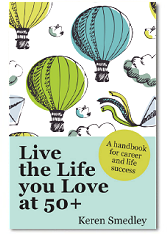Keren Smedley 22nd August 2016
Finding it hard to sleep?
 I thought I’d continue with the theme I started last week as so many people talk to me about managing their stress and finding it hard to sleep.
I thought I’d continue with the theme I started last week as so many people talk to me about managing their stress and finding it hard to sleep.
Many of us think that the best way to make decisions and process information is to keep turning over whatever it is that is troubling us. We worry that, if we stop thinking, we’ll forget what we need to do. The fact is that we think using both the conscious and unconscious parts of our brains. Because we can’t tangibly reach the unconscious bit, we assume that the only part that works is the conscious one and, therefore, to solve the issue, we need to be aware of it all of the time.
Our conscious brain can’t process too much at once. However, our unconscious mind is very good at doing just that and we need to learn to trust it. One useful trick is to leave things alone in our heads for a while and get on consciously with something else. When you return to the problem, you may be surprised to discover you’ve got the answer.
It’s important when we’re worrying, to identify if there’s anything we can do about it. If there is, then being relaxed so you can coolly and calmly come to a solution is essential. If you’re in a high state of angst, the answer will elude you. If you can’t do anything about it, you need a break. Compartmentalise it and return to it at a later date.
Sometimes, we get into a worry pattern because we’re tired and it becomes a vicious circle. We’re worried so we don’t sleep and then become too tired to cope and too overtired to sleep. When we sleep, we give our body and brain a rest and allow our unconscious time to work things out. Most of us have had the experience of going to bed not knowing the answer and waking up with one.
As we don’t function as well when tired, we develop symptoms such as memory loss, clumsiness, aches and pains and foggy, unclear thinking. All of these are similar symptoms to those seen in some old people. If we’re already anxious about getting older, this anxiety will merely exacerbate the feeling that we’re old and deteriorating. The truth is that maybe we’re just tired.
My tips for a good night’s sleep
- Do some exercise every day (not just before bed). Exercise uses energy and our body responds by wanting to replenish itself for the next day.
- Don’t eat or drink just before you go to bed.
- If you can’t sleep, get up and do some relaxation exercises.
- Take in three deep breaths through your nose, then breathe out through your mouth. Breathe in and tighten the muscles in your feet as you breathe out, relaxing the muscles. Repeat three times. Now do exactly the same with your ankle muscles followed by your calf muscles, thighs, tummy, chest, hands, wrists, fore- and upper arms, shoulders, neck, face, eyes and top of your head. You’ll feel appreciably calmer at the completion of this routine.
- Avoid the TV as it may well wake you up
- Try to get into a routine so you have approximately the same amount of time in bed each night. We are habitual creatures.
- Make sure you’re warm. This helps the blood vessels dilate and the body to settle down.
- If your mind still isn’t calm, listen to a story tape or music as you drift off to help your brain slow down.
Please take a look at this link and look at cortitrol . Many people find this really helpful. If you want to know more please send us a message and Susie will get back to you .
For tips and regular newsletter: ‘Feel younger, look and enjoy life more’
PS please share this if you think that it might help someone else.
Share this ..


